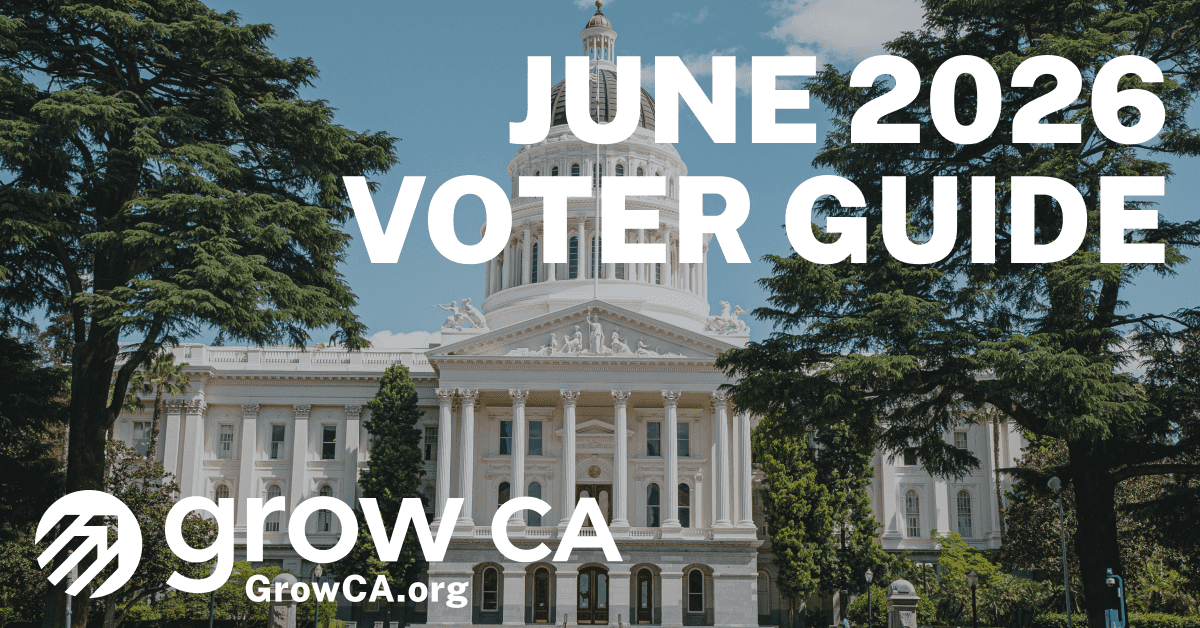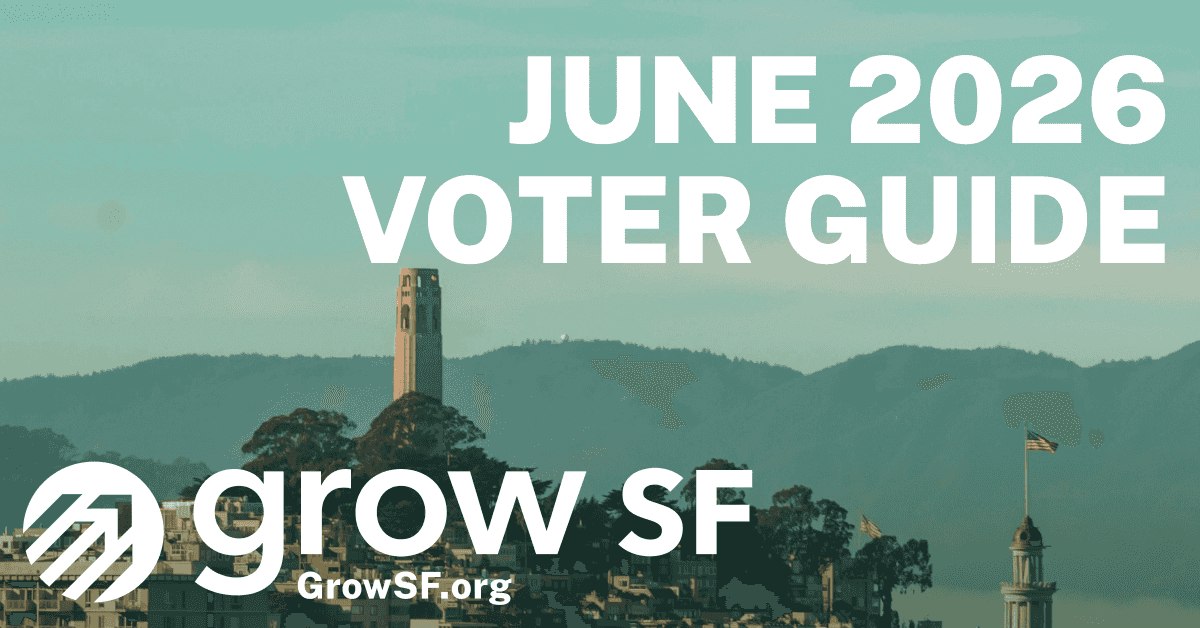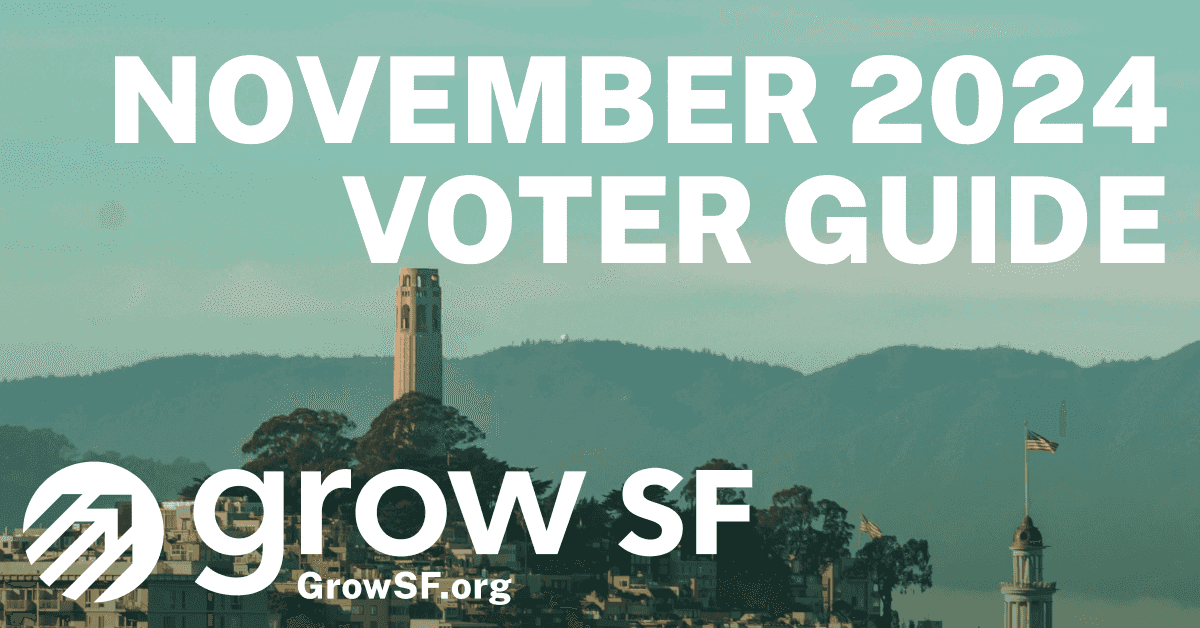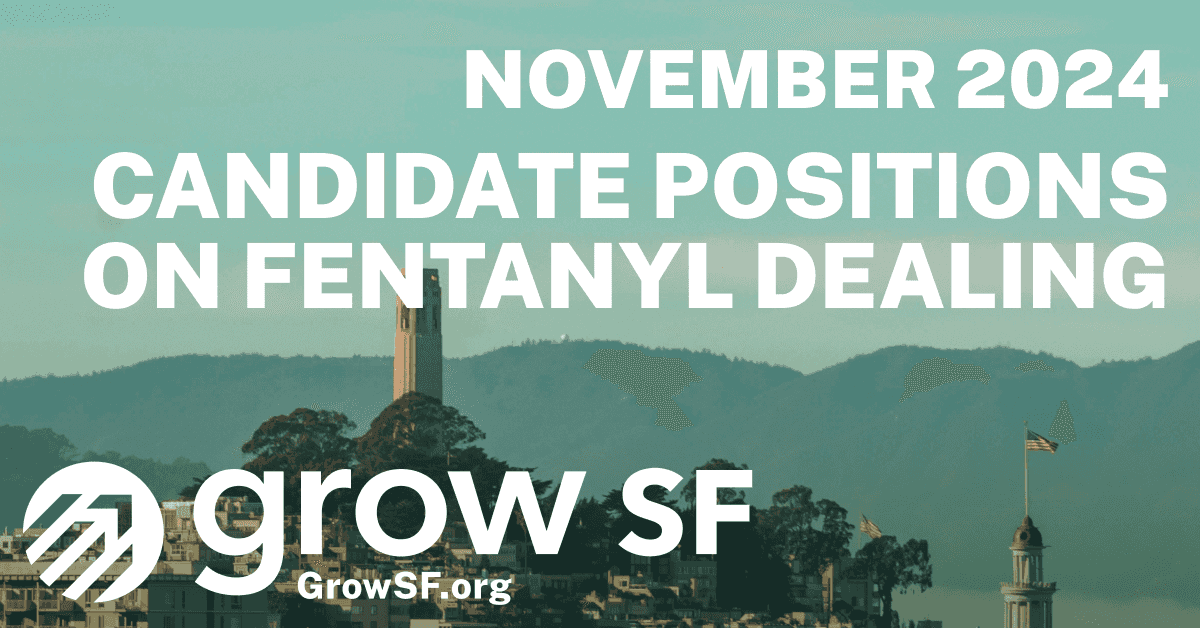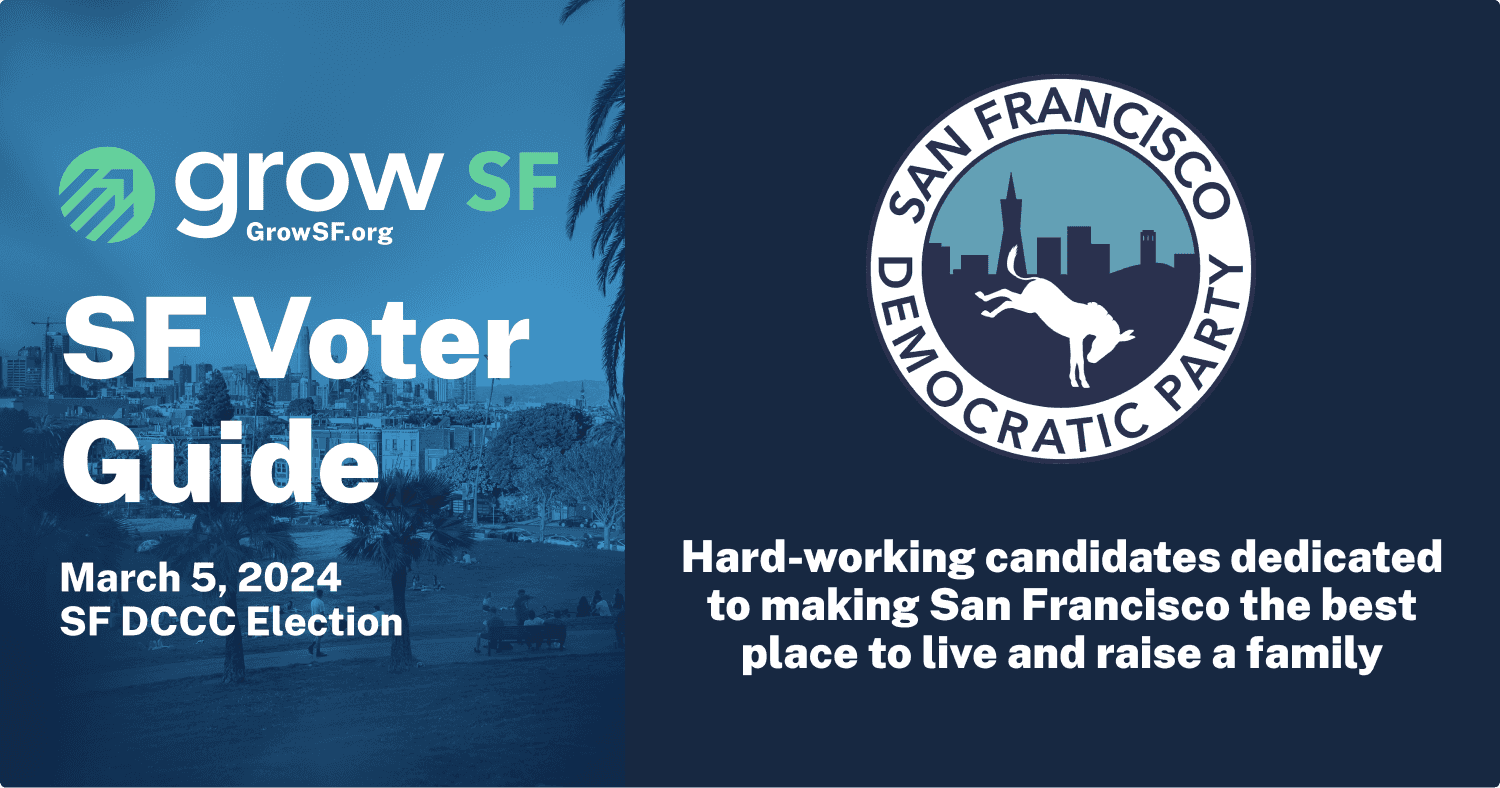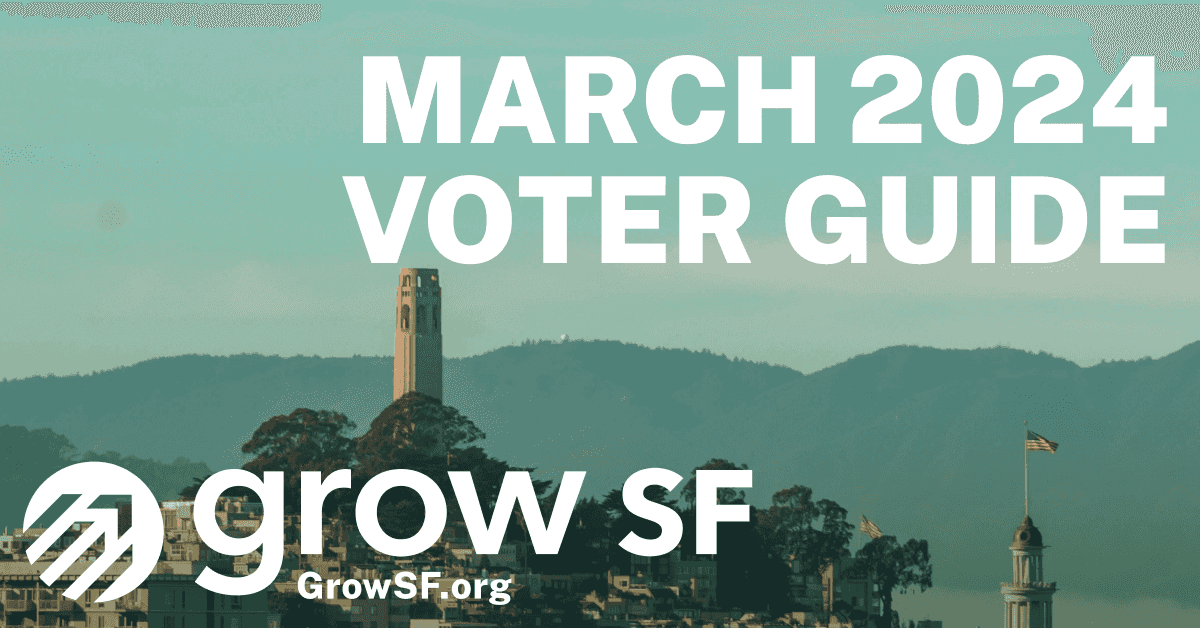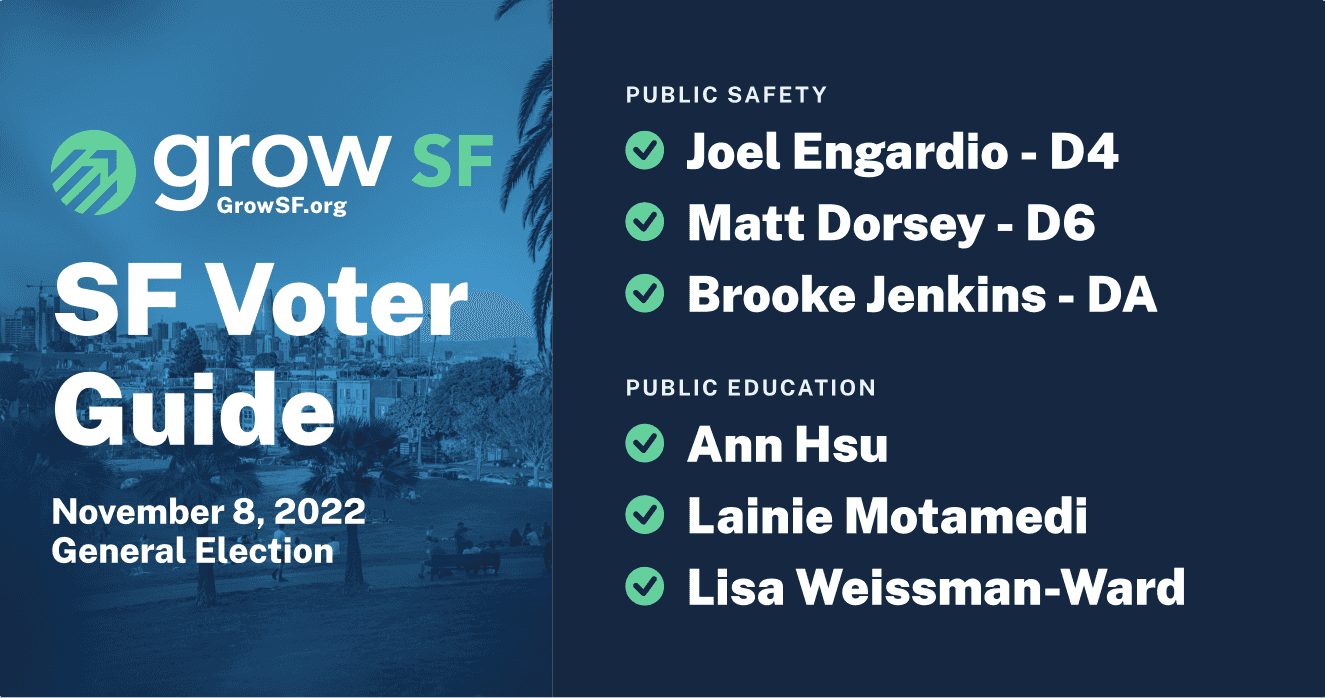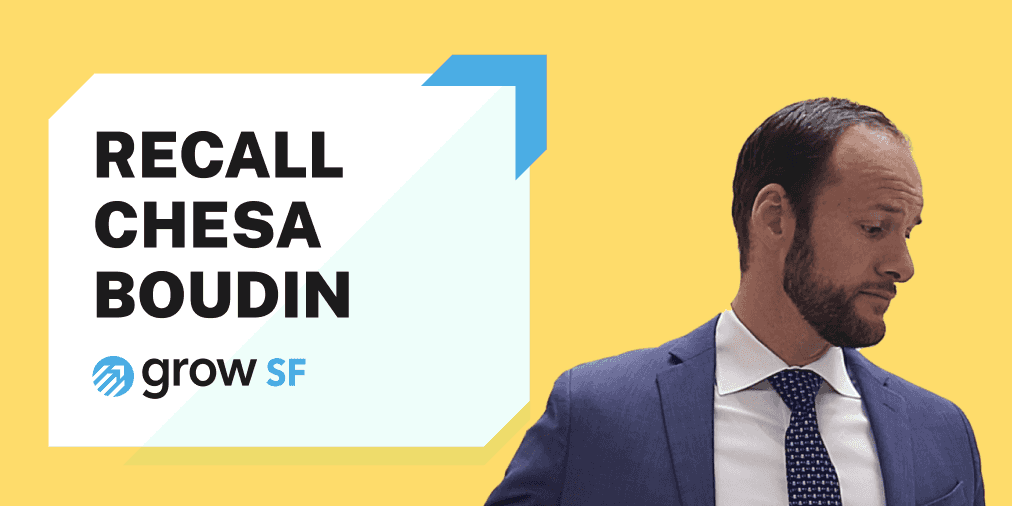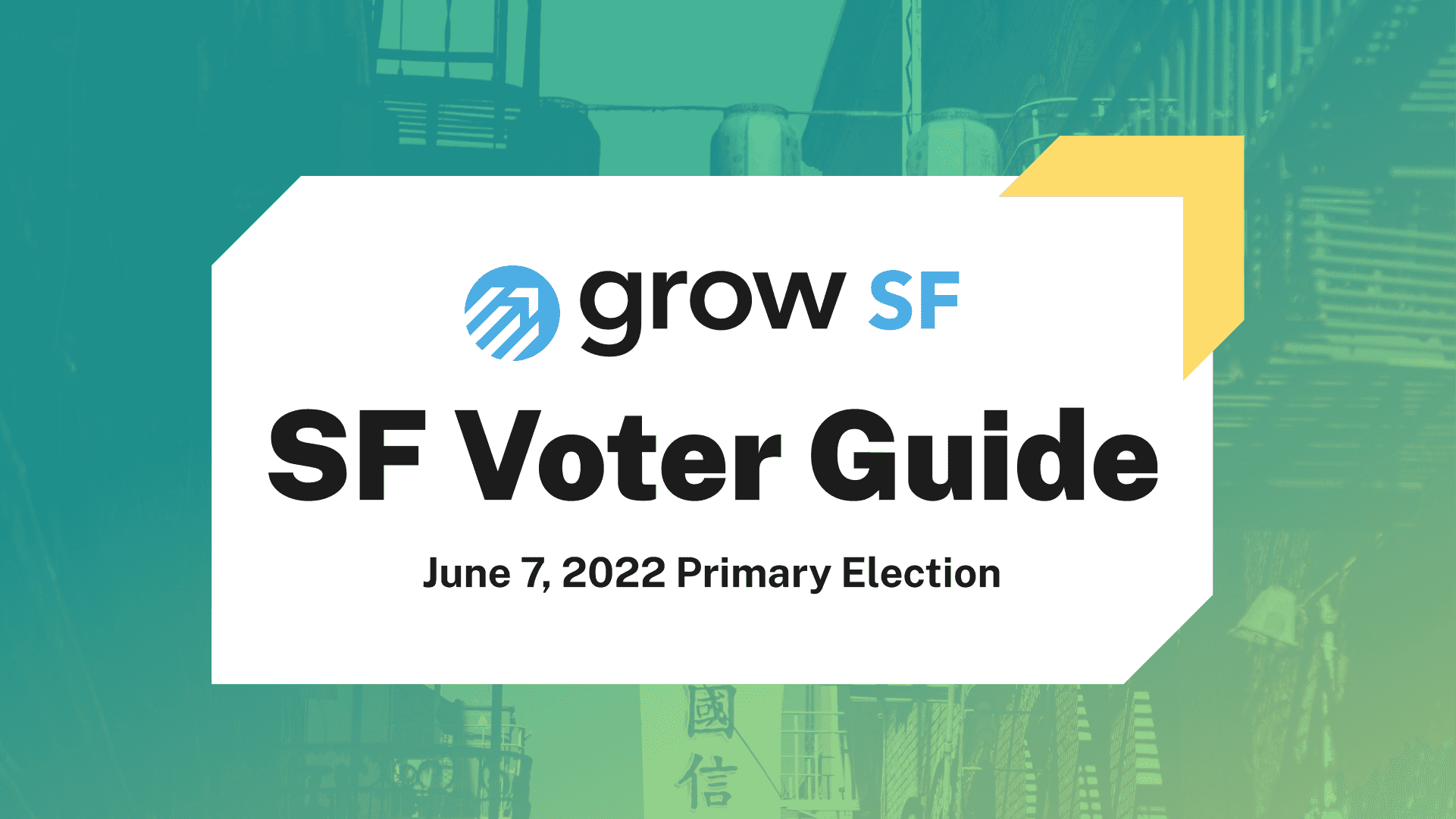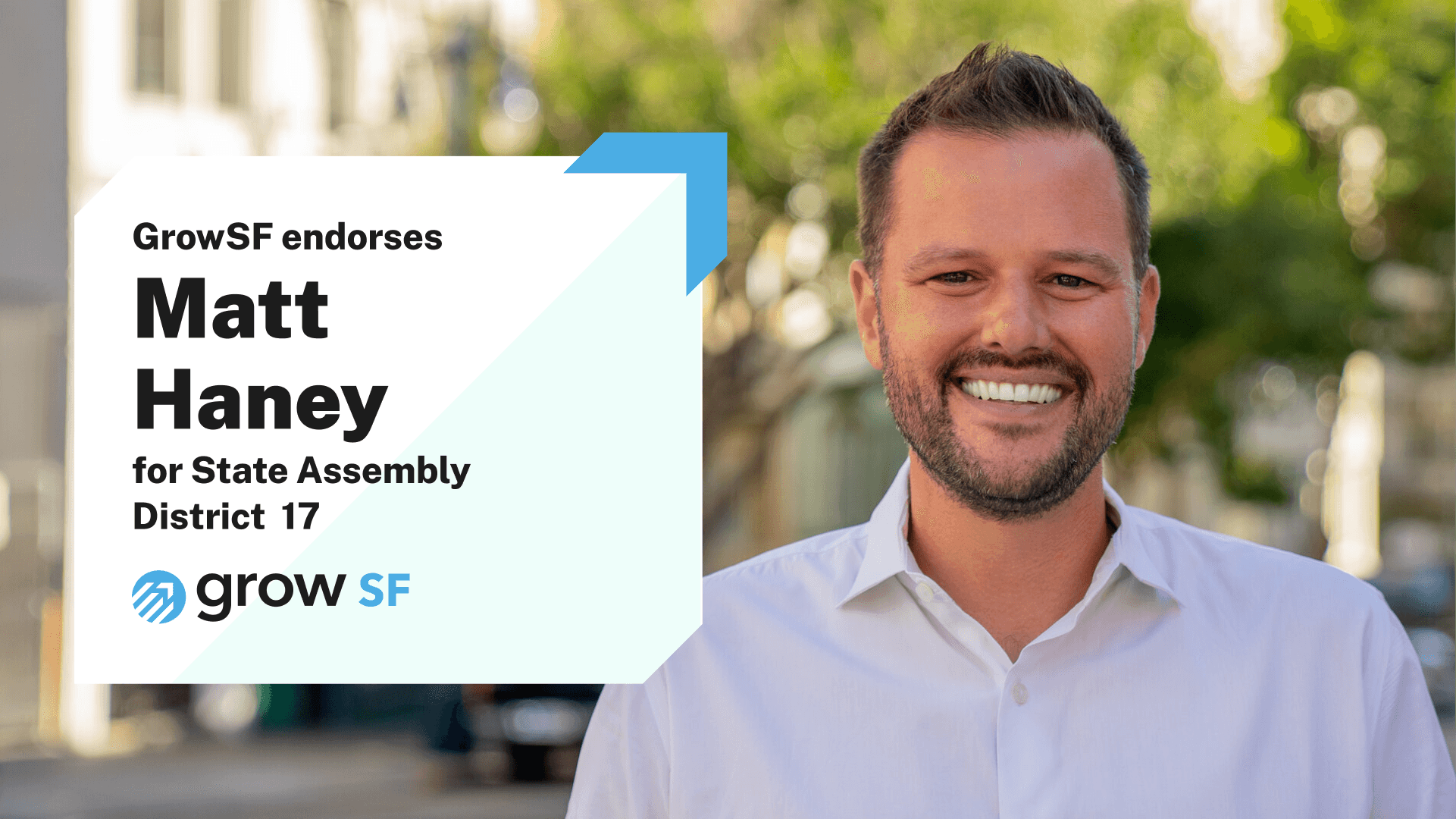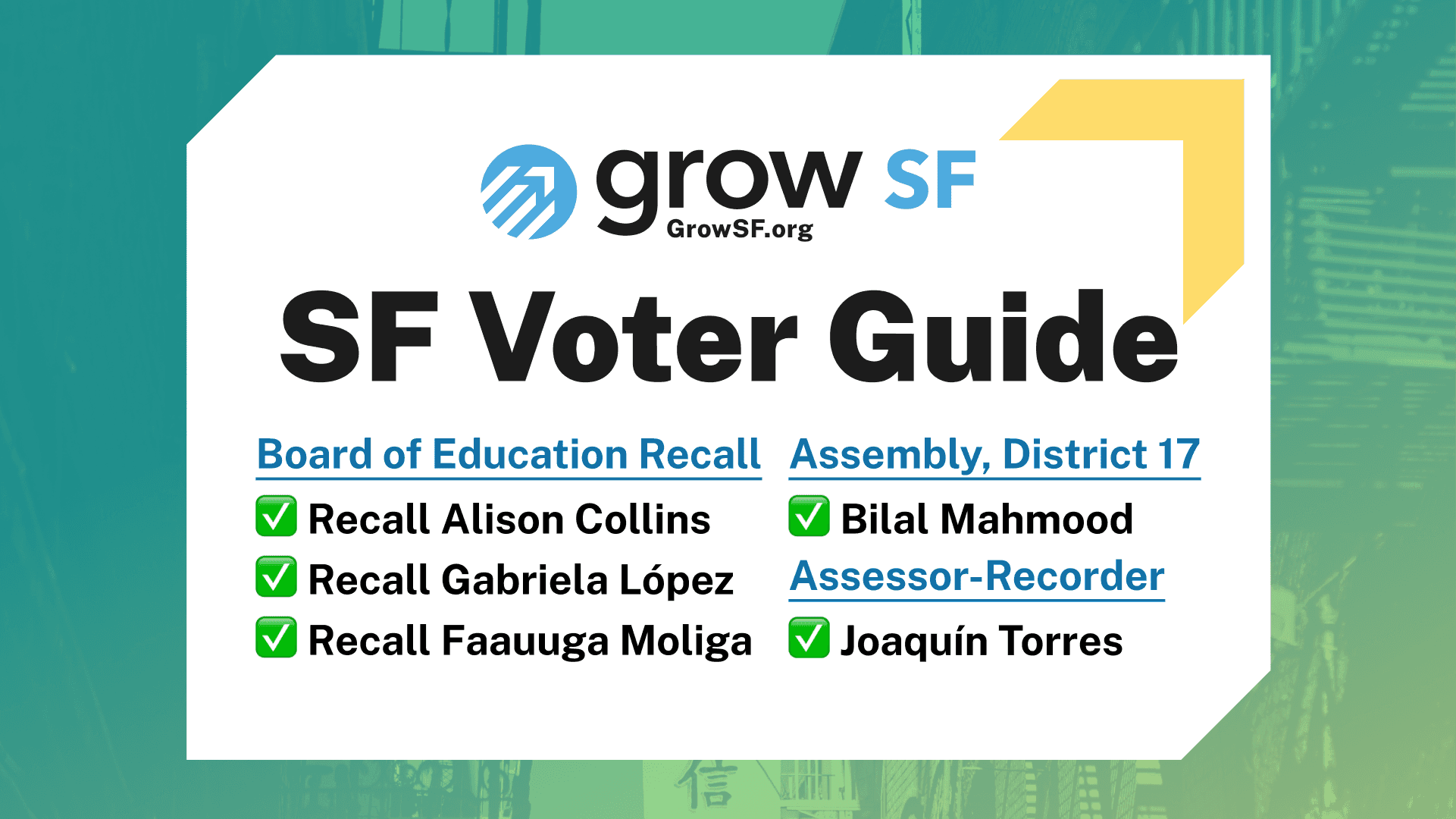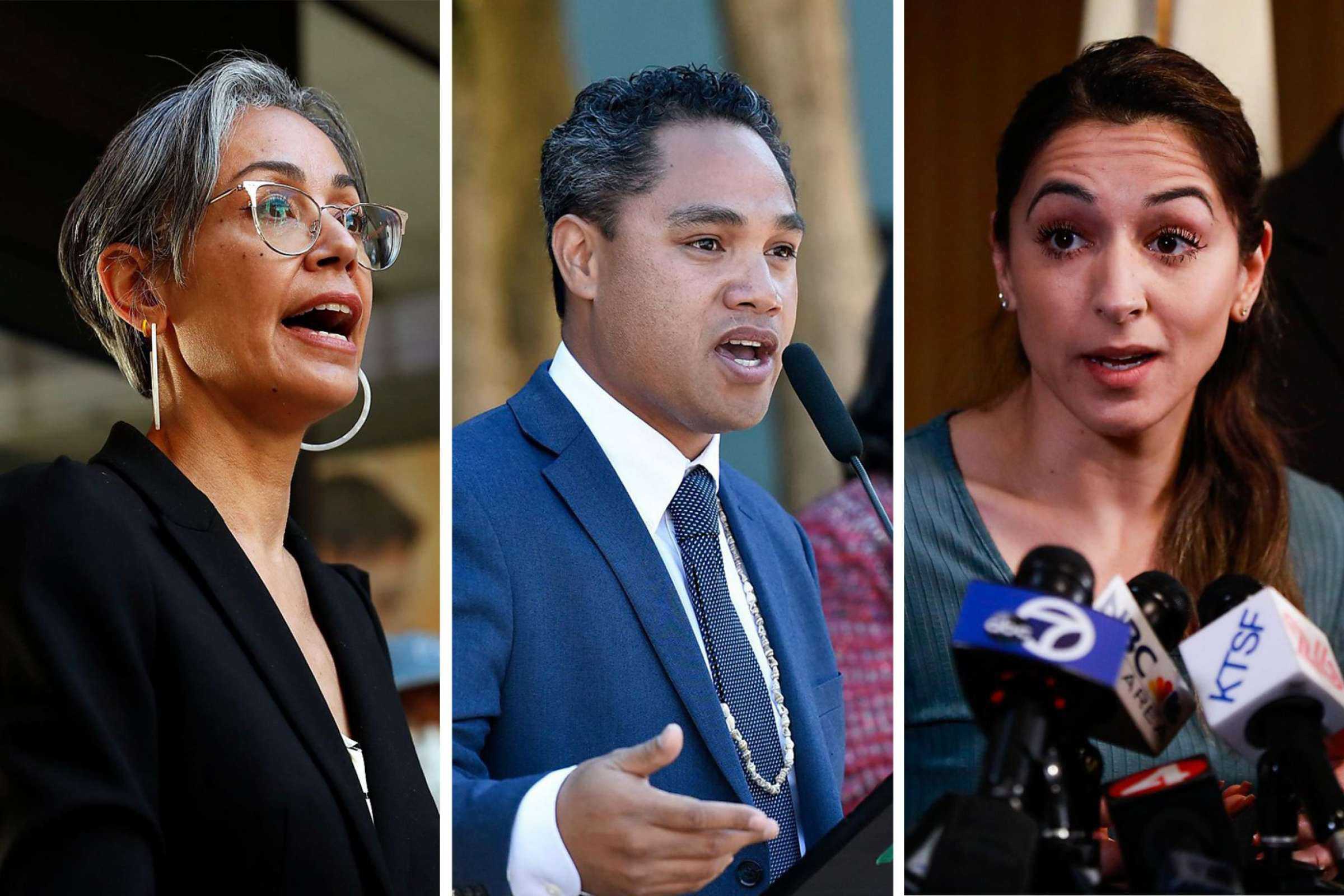November 2020 Voter Guide for Growth
Last Updated: November 03, 2020

It’s been an incredibly hard year, due mostly to the detrimental effects the COVID-19 global pandemic has had on our health and the economy. But a worsening climate, widespread racial injustices, and diminishing trust in government has made things feel even more difficult -- insurmountable at times. However, we can change all of these things for the better with one simple action: voting.
You’ll notice that we put local races at the top of our voter guide. That’s because you can make such a significant impact right in your own backyard. For instance, if we can collectively improve climate issues locally, then that can have a global impact. So for voters in San Francisco, how you vote on local races can affect your everyday life far more than who you select for President.
For each race you will see who we are endorsing. For more details you can click/tap to read more about our choice. And remember: some local races and ballot initiatives are decided by just a few dozen votes. Your voice matters!
Our Endorsements
Board of Supervisors
Marjan Philhour
Board of Supervisors, District 1
Danny Sauter
Board of Supervisors, District 3
Vallie Brown
Board of Supervisors, District 5
Myrna Melgar/Joel Engardio/Emily Murase
Board of Supervisors, District 7
No Position
Board of Supervisors, District 9
Ahsha Safaí
Board of Supervisors, District 11
San Francisco Local Measures
✅ Yes on Prop A
Health and Homelessness, Parks, and Streets Bond
❌ No on Prop B
Department of Sanitation and Streets, Sanitation and Streets Commission, and Public Works Commission
✅ Yes on Prop C
Removing Citizenship Requirements for Members of City Bodies
🤷🏾♀️ No position on Prop D
Sheriff Oversight
✅ Yes on Prop E
Police Staffing
✅ Yes on Prop F
Business Tax Overhaul
✅ Yes on Prop G
Youth Voting in Local Elections
✅ Yes on Prop H
Neighborhood Commercial Districts and City Permitting
❌ No on Prop I
Real Estate Transfer Tax
✅ Yes on Prop J
Parcel Tax for San Francisco Unified School District
✅ Yes on Prop K
Affordable Housing Authorization
❌ No on Prop L
Business Tax Based on Comparison of Top Executive’s Pay to Employees’ Pay
✅ Yes on Measure RR
Caltrain Sales Tax
BART Board
Lateefah Simon
Bart Board District 7
Bevan Dufty
Bart Board District 9
Board of Education
City College Board of Trustees
California State Measures
✅ Yes on Prop 14
Borrowing for Stem Cell Research
✅ Yes on Prop 15
Schools and Communities First (Split roll)
✅ Yes on Prop 16
Repeals Prop 209, ending the ban on affirmative action
✅ Yes on Prop 17
Free the Vote, grants the right to vote to people on parole
✅ Yes on Prop 18
Allows 17 year olds to vote, if they turn 18 by the general election
✅ Yes on Prop 19
Property Tax Breaks and Wildfire Fund
❌ No on Prop 20
Tougher on parole, property crimes
✅ Yes on Prop 21
Rent & vacancy control
🤷🏾♀️ No position on Prop 22
Uber/Lyft classification
🤷🏾♀️ No position on Prop 23
Dialysis Regulation
❌ No on Prop 24
Consumer Privacy Law
✅ Yes on Prop 25
Upholds SB10 which ends cash bail
California State Candidates
Scott Wiener
CA State Senate, District 11
David Chiu
CA State Assembly, District 17
Phil Ting
CA State Assembly, District 19
California Federal Candidates
Joe Biden & Kamala Harris
United States President and Vice President
Nancy Pelosi
US Representative, District 12
Jackie Speier
US Representative, District 14
Explaining our Endorsements
Board of Supervisors
Marjan Philhour
Board of Supervisors, District 1
District 1 is at a crossroads. The Richmond District has reliably elected Progressive candidates since returning to district elections in 2000, however after 20 years of the same kind of leadership in the neighborhood, change is in the air.
Marjan Philhour understands The Richmond. She is raising a family here, she operates a small business here, and she knows that we need to make it easier to do both of those things in San Francisco. Marjan won’t be afraid to make the tough decisions for the good of our city not just now, but 50 years from now. We need leaders who say yes to housing on the Westside, who are committed to good governance reforms, and will be there for their constituents.
We are proud to recommend Marjan Philhour as the sole choice for District 1 Supervisor
Danny Sauter
Board of Supervisors, District 3
When you think of San Francisco, it’s hard not to conflate it with District 3. Home to Chinatown, North Beach, Telegraph Hill, Nob Hill, and the Financial District, it contains a lot of quintessential San Francisco. In fact, it may look the same as what you saw in a movie 30 years ago because current leadership thinks it should stay that way.
What a breath of fresh air Danny Sauter is. He has spent years in the community working to deliver actual progress in the neighborhood. He has down-to-earth plans to bring much-needed changes, even simple things like ensuring our streets are cleaner and safer, and he knows we need to make it easier to add apartments and open small businesses in every neighborhood.
Danny is the kind of new leadership we need at City Hall, informed by all of his community and willing to rise to the challenges ahead of us.
We are proud to recommend Danny Sauter as the sole choice for District 3 Supervisor
Vallie Brown
Board of Supervisors, District 5
In District 5, voters have a rematch of the top two candidates in the last election just 1 short year ago. Vallie Brown lost by the narrowest of margins in that off-year special election, but 2020 and the turnout of a Presidential race bring new promise, which is why it’s so important to remember to vote in these down-ballot races.
Vallie is a worker. She gets things done. She passed numerous pieces of legislation in her short time on the board filling Mayor Breed’s seat. She’s a staunch supporter of more housing and fair-minded reforms to make our government more effective for all San Franciscans. Her opponent says things that may sound superficially pleasing, but has done nothing to back up those claims of bringing free Muni and social housing to the City.
We support people who get the job done. We are proud to recommend Vallie Brown as the sole choice for District 5 Supervisor
Myrna Melgar/Joel Engardio/Emily Murase
Board of Supervisors, District 7
Every cycle, it seems there is one Supervisor race that is a bit more chaotic than the others. This year, that race is District 7. 6 people are vying for the seat, and 4 of them are legitimate contenders to potentially end up as the next D7 Supervisor.
Joel Engardio is running for the 3rd time. In 2016, he garnered just under 22% of the vote. Similarly, in 2020, it appears unlikely he or anyone will get a majority of the votes in the first round of voting. Since 2016, Joel has tacked significantly to the right on issues of public safety and has backed away from more public support of more housing in D7, but he remains a strong contender for this seat.
Myrna Melgar most recently served on the Planning Commission. She is the candidate most comfortable discussing housing and the role D7 can play in our citywide housing shortage. In addition she brings significant experience to some of the issues that we face as a city right now and has been pragmatic in her past leadership roles, all qualities that will come in handy should she win.
Emily Murase jumped in the race late, but shouldn’t be discounted. She most recently served as Director of the San Francisco Department on the Status of Women for 15 years and has long been involved in public service in San Francisco. She has prioritized working to get more federal funding to create permanent housing for people experiencing homelessness and economic recovery as parts of her message.
This is a race where your ranked choice vote will matter. We recommend you rank these candidates 1,2,3 however we do not have any recommendations on the specific ranking order, and remember: you do not need to rank every candidate.
No Position
Board of Supervisors, District 9
There is no one running against the current incumbent. Given that, we are taking no position in this race
Ahsha Safaí
Board of Supervisors, District 11
Time is a flat circle in San Francisco. Though you would be excused for not knowing it, this is actually a rematch of 2008. This time, Ahsha Safaí is the incumbent facing someone who wants his old job back.
In his time in office, Safaí has brought hundreds of new homes to District 11, worked to ensure the streets are safer and cleaner, and has hosted the first vehicle triage center for people living in their vehicles. He has the strong support of labor and will continue to prioritize the kind of work that keeps the lights on in the District, as he has shown in the past 4 years.
We are proud to recommend Ahsha Safaí as the sole choice for District 11 Supervisor
San Francisco Local Measures
✅ Yes on Prop A
Health and Homelessness, Parks, and Streets Bond
The City and County of San Francisco has a measure like this on almost every ballot, and perhaps you are wondering why. The majority of these bonds are ”general obligation bonds”, where the city borrows against itself to fund a variety of improvements and maintenance. After a series of failed bonds, the City came up with a bonding schedule, capping the total it borrows and spreading out bonds that pay for all manner of public goods, whether it’s improvements to our parks, affordable housing, seawall repair, or street repaving.
This year’s bond is a grab bag of items to help support some of the areas particularly hard hit but COVID-19: it includes funding for health and homelessness services as well as repairs for parks and streets, in a combination of supportive services and funding for shovel-ready work to get people back on the job as we recover from this pandemic. The City has an excellent bond rating and there’s no better time to borrow than now. This bond will fund important services today and since the bonds are carefully rolled out by the city, we’ll be doing so in a fiscally responsible way. This is an easy decision.
Vote Yes Prop A this November.
❌ No on Prop B
Department of Sanitation and Streets, Sanitation and Streets Commission, and Public Works Commission
It’s no secret that the Department of Public Works has its issues. The former Director of the department was arrested by the FBI earlier this year after news of numerous corruption charges and news is still trickling in about the level of alleged corruption occurring within our city government.
It’s in that backdrop that Supervisor Matt Haney proposed this ballot measure and got enough signatures to get it on the ballot. The proposal, at its most basic, would break up Public Works into two departments, with one directly responsible for sanitation and streets, and add commissions oversight to both departments.
While the goal is noble, there’s no proof that creating extra bureaucracy will do anything to improve the performance of this department. This also does little to address some of the issues coming to light with why this kind of corruption occurs in the first place. Simpler, streamlined processes and easier, more predictable approvals would go much further towards eliminating opportunities for the kinds of public corruption alleged here, but this ballot measure doesn’t take any of that on.
We don’t need more commissions just for the sake of having them. We need to start unwinding the opaque bureaucracy and make it easier for the average citizen to get what they need while making it simpler for the average government employee to deliver quality service. Since this doesn’t address those underlying issues, we cannot support this measure and encourage you to vote no on Prop B
✅ Yes on Prop C
Removing Citizenship Requirements for Members of City Bodies
San Francisco has made a point of expanding the rights of non-citizens in the past few years. We applaud the effort to ensure that anyone who lives here can truly get involved. Especially in an industry like tech, many people who live here are not citizens, but pay taxes, send their kids to school here, and deserve a say in what is going on in the city the same as everyone else.
Prop C seeks to remove the barrier to non-citizens serving as members of city bodies such as commissions. It’s long overdue that we allow all San Fransiscans who may be interested to serve in this capacity, regardless of their immigration status.
Vote Yes on Prop C.
🤷🏾♀️ No position on Prop D
Sheriff Oversight
This election’s Prop D seeks to take on one of the most pressing issues of our time in police oversight. As a city and county, San Francisco has both a police department and a Sheriff’s office. This measure is seeking to establish an oversight committee to develop a use of force policy, develop policy recommendations, and oversee complaints.
Again, this is another instance where the idea behind this makes a lot of sense. It’s not entirely clear this is the precise way to accomplish it, but it does enjoy the support of many of the elected officials in the city. Police reform is important and we hope the city continues to make strides on this. But it’s uncertain how this will be funded or how it will end up working in practice given there are already entities doing this work supposedly.
Given the lack of clarity about some aspects of this, we are not taking a position on this.
✅ Yes on Prop E
Police Staffing
Spend enough time reading the City Charter and you will realize there are some odd things in there. For example, we have a line that states the police will maintain a minimum workforce of 1,971 employees. In our City Charter! It’s a weird thing to just put in a City Charter.
We applaud efforts to make our government make more sense. This kind of stuff shouldn’t be in our charter in the first place. While it may feel a bit ridiculous to have to vote on it, that’s how our government is structured.
There’s no reason to have this in the charter. In addition, we’ve never even hit this supposed staffing minimum.
Join us in voting Yes on Prop E to remove one small bit of bad governance from the books
✅ Yes on Prop F
Business Tax Overhaul
While Prop F would raise taxes on the whole, it would also create a more efficient tax code by phasing out the City’s 0.38 percent payroll tax (which disincentivizes employment and hiring) and increases the gross receipts tax (GRT) rates over the next few years. If passed, some businesses in industries most impacted by the pandemic (E.g., retail, hospitality, restaurants) won’t see tax hikes until 2024. The measure will reduce the annual business registration fee for businesses with $1 million or less in San Francisco gross receipts and increase the small business exemption ceiling for the GRT to $2 million.
The pandemic has slashed SF’s tax revenues in a sudden fashion, and this budget hole needs to be closed to prevent drastic cuts to city services. Prop F is our best hope to fund the budget without being forced to make major reductions. We’ve seen this before as a city, when then-Mayor Gavin Newsom proposed a similar tax in light of recession-induced reductions in tax revenue. The measure failed, and the impacts included “reduced hours at public health clinics, rotating closures of fire stations, increased Muni fares, and hundreds of city jobs suddenly gone” according to the SF Chronicle. Due to COVID-19, the cuts will likely be even more painful.
While we recognize that this measure would indeed impact the bottom line of some major tech companies by forcing them to pay more taxes, we are focused on bringing tech into the fold to develop a positive long-term vision of a well run city with opportunity for all.
✅ Yes on Prop G
Youth Voting in Local Elections
Prop G is another measure along the lines of this year’s Prop C, seeking to increase the engagement and opportunity to get involved and have a say in our government for more San Franciscans. In particular, Prop G aims to extend the right to vote to 16 and 17 year old citizens.
Voter turnout continues to be an issue, particularly among young people. Creating opportunities to help younger voters build that habit is a great idea. Creating a generation of more civically engaged young people should be a top priority as we grapple with issues they will increasingly have to deal with such as climate change.
Much as we want to see people in tech get more involved in shaping this city, we applaud efforts to get young people more involved in the same way. Vote yes on Prop G.
✅ Yes on Prop H
Neighborhood Commercial Districts and City Permitting
One of the many issues that continues to hamper San Francisco is the scleretic pace of doing business here. Ask anyone who has opened a small business and they will tell you just how challenging it is to add to the fabric of San Francisco. These long delays drive up costs: merchants have to pay months of rent on empty storefronts, which means only people with deep pockets can afford to deal with the headaches and multi-month delays, and even they get tired of the unpredictable nature and excessive fees.
Enter Prop H. This is designed to speed up the review for business in our existing commercial districts and allow for more flexible uses by requiring a streamlined, 30 day review. While this does not have any specific provisions to help existing businesses, it is incredibly important that we make it easier for new businesses as well in this challenging time.
It’s vitally important that we do more to make it easier for San Franciscans to open businesses and it’s past time we took this on. Vote Yes on Prop H
❌ No on Prop I
Real Estate Transfer Tax
TL;DR: This is an inefficient and counterproductive tax that will hurt the city in the long run by penalizing large housing developments and exempting single family homes. Vote NO.
While we are not inherently opposed to higher real estate transfer taxes, this is a poorly written proposition that would make it harder to build dense, multifamily housing while exempting almost every multi-million dollar single family home and mansion under $10M.
Doubling the (already high) transfer tax on large, multi-family properties will discourage the production and development of the housing the city needs to climb out of its housing shortage. Furthermore, this reduced housing development will “have a negative net impact on the city’s economy” according to the non-partisan analysis from the SF Controller’s analysis.
We agree with the SF Controller who summarizes the impact of this tax in saying that “ the real incomes of San Francisco households would decline, on average, because of the lower incomes and higher housing prices. San Francisco would become less attractive economically as a place to live. Consequently, the city’s population would decline, with both fewer migrants moving in, and more residents moving out”.
This is the exact opposite of the sustainable, inclusive growth we want in SF, and is why we suggest voting NO on Prop I.
✅ Yes on Prop J
Parcel Tax for San Francisco Unified School District
Prop J is a parcel tax to pay for raises for educators in San Francisco Unified School District (SFUSD) and if it seems familiar, it’s because there was a similar measure in 2018. However, the 2018 measure has been held up in court, and this is aiming to repeal that measure and replace it starting in July 2021 and running for 17 years.
Basically, our city is getting creative in trying to free up money for teacher raises that are desperately needed. While it’s a bit of a wonky workaround, this is the kind of stuff that the prop system creates. However, a parcel tax is also the kind of measure that needs to go to the voters. The net effect will be negligible to San Franciscans other than those getting paid by SFUSD as long as this one passes, but it’s easy to vote yes on a parcel tax to ensure that we pay our educators. Teacher salaries aren’t the only issue SFUSD faces, but no ballot measure can solve every issue.
Vote Yes on Prop J
✅ Yes on Prop K
Affordable Housing Authorization
Prop K is an interesting one. Some proponents are leaning heavily on the fact that it will authorize the creation of social housing. In addition, this increases the authorization of the number of affordable housing units that can be built. The reason we need to vote on that is because we have Article 34 in our California Constitution, which requires voters to approve public housing before it is built in a community. San Francisco has historically addressed this by periodically voting on large quantities of future affordable housing.
If social housing is a strong path forward to create more homes in San Francisco, that would be great to see. But this measure does nothing to ameliorate the same problems that plague our current housing shortage, from long delays and uncertain costs to many veto points, and it’s hard to believe that will change just because we authorize social housing. There’s also no direct funding for the pilot, either.
Still, upping our authorization for affordable housing and creating a path to explore social housing should we choose to are worthy goals. Vote Yes on Prop K.
❌ No on Prop L
Business Tax Based on Comparison of Top Executive’s Pay to Employees’ Pay
Prop L seeks to tax employers based executive pay ratio. In other words, it’s seeking to tax employers based on the gap between their top executives and their workers, starting at 100:1 and going up from there
We applaud the effort of closing that gap, but it’s unclear that this will accomplish that as many questions remain about how compensation will be calculated or what other impacts it will have. Thus, we recommend voting no on Prop L
✅ Yes on Measure RR
Caltrain Sales Tax
TL;DR: Caltrain will be forced to shut down unless they receive funding. Measure RR is a small 1/8th cent sales tax increase (meaning if you bought a $8 sandwich for lunch, you would pay an extra penny in tax) that will save Caltrain. Vote YES
We STRONGLY SUPPORT Measure RR.
Before the pandemic, Caltrain was one of the most efficient forms of public transit, receiving 70% of its funds from fare revenue, and lacking a dedicated funding source beyond that. When the pandemic hit, ridership evaporated overnight, and that funding dried up as a result. This will require Caltrain to shut down all service, unless a new source of funding can be found, and that is where Measure RR comes in.
If passed, Measure RR would allow Caltrain not just to keep running, but to implement service improvements such as electrification (which is better for the environment and means trains will be able to go faster and run every 10-15 minutes) and equity programs that will make the service more accessible for marginalized and working class communities.
Furthermore, the environmental benefits of Caltrain are enormous: before the pandemic, Caltrain kept 4 lanes worth of cars off of freeways and roads, removing 400 million driving miles per year, and 110 metric tons of carbon emissions every day.
The Bay Area needs a sustainable, transit-oriented future, and we cannot let Caltrain shut down indefinitely. Vote YES on Measure RR.
BART Board
Lateefah Simon
Bart Board District 7
Bay Area Rapid Transit (BART) is governed by a 9 member board. Similar to many other boards here, the elections are staggered with odd seats up this year. There are two seats in 2020 with implications on San Francisco. Lateefah Simon currently represents District 7, which includes swaths of three counties, including the eastern edge of San Francisco. Simon has been a strong voice for equity on the BART Board and has especially been a leader in the role of police and BART, striving to create a safer system for riders by expanding the use of unarmed ambassadors in the place of police.
She will continue to be a strong voice in ensuring BART is creating a better experience for riders, supporting transit-oriented development, and making sure we have a just policing policy. We’re proud to support Lateefah Simon in her re-election bid
Bevan Dufty
Bart Board District 9
Bay Area Rapid Transit (BART) is governed by a 9 member board. Similar to many other boards here, the elections are staggered with odd seats up this year. There are two seats in 2020 with implications on San Francisco.
Beven Dufty, the incumbent in District 9, is running to once again represent the district that consists of the area around most of the core stations in San Francisco, from Montgomery Street down to Glen Park.
Dufty, a former Supervisor, has represented District 9 since 2016, has prioritized improvements of the day-to-day experiences of riders, especially in and around the Mission District stations. He has also been a supporter of moving BART to a more progressive policing model that will serve the everyday riders of the system.
He will continue to prioritize the safety and reliability and be a steady hand as BART recovers from the pandemic. We’re proud to support him in his re-election bid.
Board of Education
Matt Alexander
Alida Fisher
Jenny Lam
Michelle Parker
The 7 member elected Board of Education serves the sensible goal of overseeing policy for the San Francisco United School District (SFUSD) and ensuring that all public school students in San Francisco receive a high-quality education. They have specifically focused in recent years in closing the achievement gap between students. However, Board of Education also serves as a springboard for future ambition. Many recent members of the Board of Supervisors have previously served on the Board of Education and use this citywide race to get their name out there. Unfortunately, that doesn’t always lead to the most optimal education policy for our city.
10 people are vying for the four open seats. It’s even more critical in a time where our education system is facing new challenges presented by COVID-19. It’s always difficult to assess the qualities of so many candidates. However, after considering the slate of candidates and what each will bring, we think the combination of Matt Alexander, Alida Fisher, Jenny Lam, and Michelle Parker make the best candidates for the four open positions.
City College Board of Trustees
Aliya Chisti
Victor Olivieri
Jeanette Quick
Tom Temprano
City College of San Francisco is the city’s community college, serving tens of thousands of students each year getting or continuing their education. Unfortunately, City College has also been troubled, with an accreditation crisis a few years back and constant questions about funding. Despite high profile wins like Free City College, there are still a lot of looming questions about the ongoing governance and issues in front of City College, like how we will even ensure Free City College for a future generation of students. The institution should be a force for unlocking the economic potential of San Franciscans, but it has been beset by mismanagement.
Again, 10 people are vying for 4 open seats on the 7 person board. Again, City College is a citywide race that can be used to bolster one’s future ambitions. When considering the candidates running, we’re recommending Aliya Chisti, Victor Olivieri, Jeanette Quick, and Tom Temprano as candidates who will actually be focused on the issue City College is facing today.
California State Measures
✅ Yes on Prop 14
Borrowing for Stem Cell Research
Prop 14 would issue $5.5 billion in bonds for the state’s stem cell research institute. In 2004, California passed Prop 7, which created the California Institute for Regenerative Medicine (CIRM), in response to attacks on stem-cell research from then-President George W. Bush. In the years since, CIRM has been responsible for two FDA-approved cancer treatments, along with breakthroughs against other diseases such as diabetes.
We support Prop 14 which would allow this medical research to continue, especially now that low interest rates make bonds more attractive.
✅ Yes on Prop 15
Schools and Communities First (Split roll)
In 1978, California passed Prop 13, which prevents property taxes from going up more than 2% each year even if property values increase more than that. While this may make sense for home-owners worried that rising property taxes will force them to sell their homes, there is no reason this should apply to massive corporations.
Prop 15 closes the loophole for large corporations. This means new businesses and start-ups buying corporate real estate will no longer be at a competitive disadvantage to entrenched competitors locked into artificially low property taxes just because they were lucky enough to buy property earlier. Furthermore, small businesses will actually receive a property tax cut with Prop 15, which is more important than ever as many are facing closures due to the pandemic.
The tax code will be fairer, more efficient, and we will raise billions of dollars to support California’s schools and other services. San Francisco alone is projected to receive $411M, which can be used to help get Muni back up and running again.
Vote Yes on Prop 15.
✅ Yes on Prop 16
Repeals Prop 209, ending the ban on affirmative action
We support Prop 16, which would repeal Proposition 209 (1996), which made affirmative action illegal in the state of California. If passed, Prop 16 would allow state/local governments and universities to use affirmative action programs to help undo decades of discrimination that have resulted in our state having one of the widest racial wealth gaps in the country
Our current system allows college admissions officers to reward legacy students and allows cities to reward friendly contractors, both practices that disproportionately shut out BIPOC students and businesses, essentially functioning as affirmative action for the privileged and affluent. However, using diversity as a factor remains illegal. This makes little sense and is why we should pass Prop 16.
✅ Yes on Prop 17
Free the Vote, grants the right to vote to people on parole
Prop 17 restores the right to vote to people convicted of felonies who are on parole. Currently, the California Constitution disqualifies people with felonies from voting until their parole is completed, despite the fact that 19 other states allow persons on parole to vote. The right to vote is a cornerstone of democracy and there is minimal justification to take away these rights for those who have already served their time in prison. Studies have shown that giving formerly incarcerated people the right to vote reduces recidivism and crime overall.
Vote yes on Prop 17.
✅ Yes on Prop 18
Allows 17 year olds to vote, if they turn 18 by the general election
Prop 18 allows 17-year-olds who will be 18 at the time of the next general election to vote in primaries and special elections. This is something that is already allowed in 22 states, and makes logical sense - if you are old enough to vote in the general election, you should be able to have a say in which candidates make it on the general election ballot.
Voting is a lifetime habit, and those who vote when they are young are more likely to vote for the rest of their lives. Democracy works best when everyone participates, and Prop 18 makes it easier for young people to have their voices heard.
Vote Yes on Prop 18 so they can in the next election.
✅ Yes on Prop 19
Property Tax Breaks and Wildfire Fund
Prop 19 changes tax assessment transfers and inheritance rules. In California, parents or grandparents can transfer primary residential properties to their children or grandchildren without the property's tax assessment resetting to market value. Other types of properties, such as vacation homes and business properties, can also be transferred with the first $1 million exempt from re-assessment when transferred. The ballot measure would eliminate the exemption in cases where the child or grandchild does not use the inherited property as their primary residence. When the inherited property is used as the recipient's principal residence but has a market value above $1 million, an upward adjustment in assessed value would occur. Beginning on February 16, 2023, the taxable value of an inherited principal residential property would be adjusted each year at a rate equal to the change in the California House Price Index.
The ballot measure would require the California Director of Finance to calculate additional revenues and net savings resulting from the ballot measure. The California State Controller would be required to deposit 75 percent of the calculated revenue to the newly created Fire Response Fund (FRF) and 15 percent to the County Revenue Protection Fund (CRPF). The CRPF would be used to reimburse counties for revenue losses related to the measure's property tax changes. The FRF would be used to fund fire suppression staffing and full-time station-based personnel.
❌ No on Prop 20
Tougher on parole, property crimes
Prop 20 would increase punishments for a variety of crimes including theft related incidents. While San Francisco is seeing an increase in burglaries and other non violent crimes, it's hard to argue that the solution is stronger sentences for crimes, especially when those penalties disproportionately affect black and brown San Franciscans. We can find a better path for restorative justice than this.
✅ Yes on Prop 21
Rent & vacancy control
Prop 21 expands local governments’ power to use rent control.
The ballot measure would replace California’s Costa-Hawkins Rental Housing Act (Costa-Hawkins), which was passed in 1995. Prior to the enactment of Costa-Hawkins, local governments were permitted to enact rent control, provided that landlords would receive just and reasonable returns on their rental properties. Costa-Hawkins continued to allow local governments to use rent control, except on (a) housing that was first occupied after February 1, 1995, and (b) housing units with distinct titles, such as condos, townhouses, and single-family homes.[1]
The ballot measure would allow local governments to adopt rent control on more housing units, but maintain restrictions on rent control on (a) housing that was first occupied within the last 15 years and (b) small housing projects such as single-family homes, condos, and some duplexes.[2]
Rent control is certainly a contentious issue and we think even though this prop isn’t perfect, the pros outweigh the cons. This bill would have a tangible impact in reducing evictions, displacement and rent-gouging, and while we are worried about the potential that this bill has to reduce the supply of new housing built, the fact is that rent control is very low on the list of reasons that housing isn’t being built in Calfornia (rather, exclusionary zoning, discretionary review, and parking minimums are much more detrimental to housing, and are all things that Scott Wiener is fighting hard to fix)
🤷🏾♀️ No position on Prop 22
Uber/Lyft classification
Prop 22 considers app-based drivers to be independent contractors and enacts several labor policies related to app-based companies.
We believe Prop 22 is a choice between not great and not great: a new job classification is needed that provides app-based service workers the protections of California employment laws while allowing the flexibility that many employees desire. When it comes to gig drivers and delivery workers, the California Supreme Court ruled they are employees and are subject to the protections of local, state, and federal employment laws. The California legislature, subsequently, passed AB5, which codifies the California Supreme Court’s ruling.
Prop 22 would exempt these app-based service worker from AB5, and would require a 7/8s majority in the legislature for any amendments to change or fix these laws in the future. While Prop 22 would provide app-based service workers flexibility, it would also reduce or eliminate protections such as minimum wage, overtime, driver reimbursement, sick leave, right to unionize, etc.
While we believe that AB5 is overly broad and is hurting some who work flexible, non-traditional hours, we also believe that many app-based service workers treat the job as full-time and should accordingly be entitled to full employment protections. While Prop 22 would enhance flexibility, it would reduce these employment protections, which we view as a mixed bag.
Furthermore, we are concerned about the 7/8ths requirement for the legislature to further modify AB5. Given the fact that the app-based service industry didn’t even exist ten years ago, and may be completely different 10 years in the future, we are concerned that this requirement may effectively make it impossible to modify or fix this proposition without an entirely new, expensive, proposition.
Ultimately, we believe the legislature needs to modernize our employment laws in a way that balances worker flexibility with worker rights.
🤷🏾♀️ No position on Prop 23
Dialysis Regulation
In short, Prop 23 requires a physician to be on-site at dialysis clinics and consent from the state for a clinic to close.
While we support this concept, we are opposed to a statewide referendum, where any changes or fixes would have to go back to the voters yet again. It does not make sense to have voters decide these highly-technical issues on dialysis, that should be the legislature’s job.
As a result, we are not making a recommendation on this measure.
❌ No on Prop 24
Consumer Privacy Law
Prop 24 seeks to expands the provisions of the California Consumer Privacy Act (CCPA) and creates the California Privacy Protection Agency to implement and enforce the CCPA. However, the CCPA was only signed into law 2 short years ago and didn't even go into effect until January of 2020.
Critics, like Richard Holober, president of the Consumer Federation of California contend "No one reads the thousands of words of legal fine print that you have to "Accept" before you can use an app or visit a website. The fine print is where you sacrifice your privacy. The same is true of Proposition 24. Its 52 pages are full of privacy reductions and giveaways to Facebook, social media platforms and big tech companies that misuse our personal information."
There's no clear reason to believe the CCPA isn't working as intended or these are necessary revisions at present. Given that, we are recommending a no vote.
✅ Yes on Prop 25
Upholds SB10 which ends cash bail
In 2018, the Legislature passed SB10, which eliminated cash bail, an important criminal justice measure seeking to reduce the influence of money as the primary factor influencing who does or does not receive bail while awaiting trail.
The top opponents of this proposition are all bail bond businesses. Cash bail disproportionately impacts lower income and BIPOC individuals. It is an unfair system and companies that profit off of a predatory industry are the main proponents of this bill. While the replacement risk-based system isn’t perfect, it’s an improvement over cash bail.
Vote Yes to end cash bail and uphold SB10.
California State Candidates
Scott Wiener
CA State Senate, District 11
We are proud to endorse Scott Wiener for SD11. Scott is a pragmatic, effective, progressive legislator with an incredible list of bills that he has passed. Some of his biggest accomplishments include:
SB35, helping quickly construct of thousands of affordable homes throughout the state SB288, preventing frivolous lawsuits from stopping bus and bike lane construction SB179, allowing non-binary gender markers on government documents SB132, protecting incarcerated trans people SB1004, expanding mental health resources for young people SB923, preventing innocent people from being mis-identified and convicted due to faulty witness testimony
We are most excited about Scott’s re-election because of bills that he introduced and fell just short - SB50 would have made a big impact in solving California’s environmental and housing crises by legalizing more, dense housing near mass transit and jobs throughout the state and Scott has promised to further optimize and re-introduce this bill if re-elected. While Scott's opponent has no elected experience, we have also been disappointed in her policy stances, which seemed to be based more about reactionary opposition to Scott rather than actually improving the city. For example, she attacked Scott for supporting SB1, a gas tax that has resulted in road repairs and billions of dollars in transit funding. She has also attacked Scott for his pro-housing stances.
We must re-elect Scott so he can continue to push for transformative bills that California needs to continue to be an innovative, opportunity-rich state.
David Chiu
CA State Assembly, District 17
David Chiu has represented California Assembly District 17 since 2014, which consists of the east side of San Francisco, consisting of North Beach down to the Bayview, encompassing areas such as SoMa and the Mission.
In his time in the Assembly, David Chiu has been a reliable leader on housing, tenant protections, and transit. He authored AB 1482, bringing some of the most progressive protections to renters across California that we have seen yet at the state level. As 2020 has influenced the number of bills that the Legislature can deal with, Chiu is sure to bring back important bills in 2021 such as one designed to create a more seamless Bay Area transit system.
He’s not afraid to take on the tough issues that matter to make San Francisco a better place for everyone, especially our most vulnerable citizens, and we are proud to support his re-election bid.
Phil Ting
CA State Assembly, District 19
Phil Ting has represented Assembly District 19 since 2012 which includes the Westside of San Francisco as well as parts of San Mateo County.
In his time in the Assembly, Phil Ting has led the way on issues such as accessory dwelling units, electric vehicles, and environmental issues. He has also been a co-sponsor on many attempts to ameliorate California’s housing crisis, signing onto bills such as Scott Wiener’s SB50.
Ting continues to sponsor and support legislation to address the many issues we are facing in California and will continue to be a reliable vote to solve our city’s issues at the state level. We are proud to support Phil Ting’s re-election bid.
Federal Candidates
Joe Biden & Kamala Harris
United States President and Vice President
We strongly support Joe Biden and Kamala Harris. Their plans on transit and housing mirror that of our local endorsement recipients and would make SF more livable and sustainable. He would also reverse Trump’s anti-urban policies and provide funding to help cities re-invest in transit.
Harris, a former San Francisco DA, has a unique connection to the city as well, showing how SF politics can be a springboard to the national stage.
Nancy Pelosi
US Representative, District 12
We are proud to endorse Nancy Pelosi for Congress, who represents D-11, covering most of SF. In her time in Congress, Pelosi has served as the first and only female speaker of the House, where she has passed monumental legislation such as the Affordable Care Act.
Most recently, she passed the CARES Act which gave most Americans $1.2k stimulus checks and enhanced unemployment in wake of the pandemic, and passed an even bigger relief bill that would provide much-needed local funding for SF.
Jackie Speier
US Representative, District 14
We are proud to endorse Jackie Speier who represents part of San Francisco as well as San Mateo County, where she has served since 2008.
A native San Franciscan, she has lived in the Bay Area her entire life, so she gets what matters here.. While taking on national issues such as gun violence, she has also been involved in securing funding for affordable housing, City College and Caltrain electrification.
Past GrowSF Voter Guides
